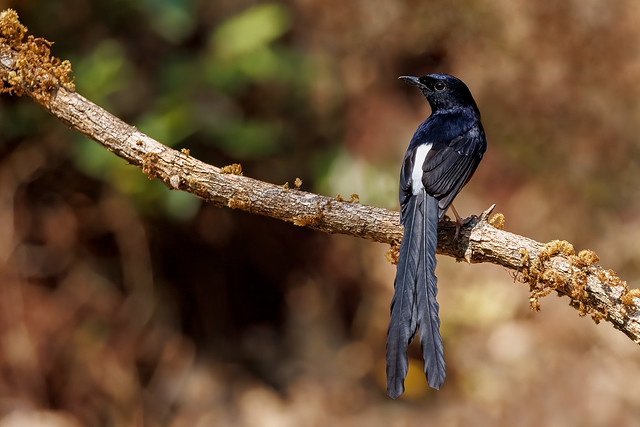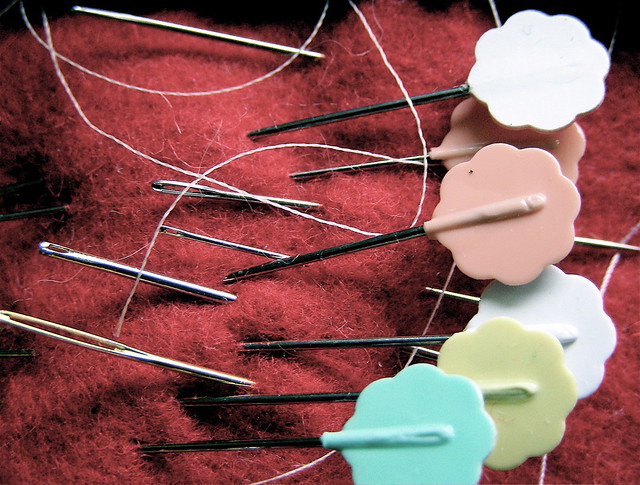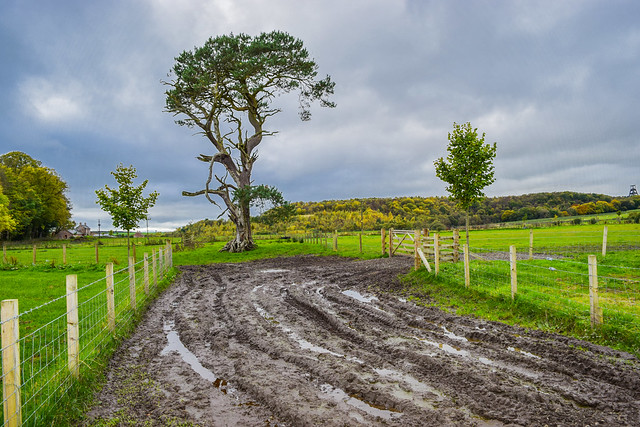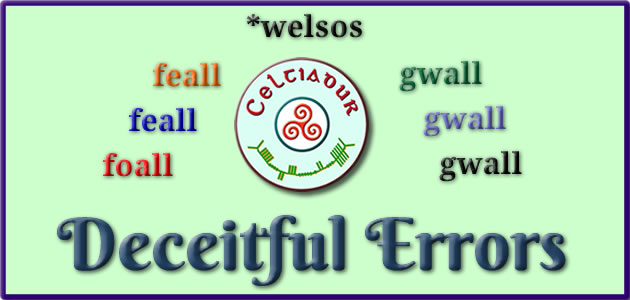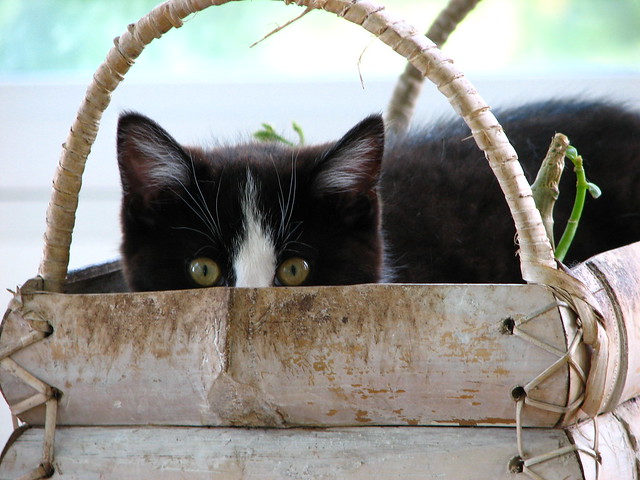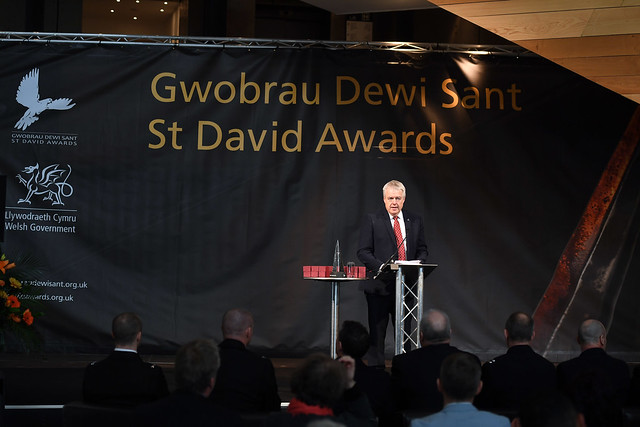Words for long, far, distant and related things in Celtic languages.
Words marked with a * are reconstructions.
| Proto-Celtic | *sīros = long |
|---|---|
| Gaulish | siros = long |
| Old Irish (Goídelc) | sír [sʲiːr] = lasting, constant |
| Middle Irish (Gaoidhealg) | sír = long, lasting, constant |
| Irish (Gaeilge) | síor- [ʃiːɾˠ / ʃiəɾˠ] = perpetual, continual, ever- síoraí = eternal, perpetual, unceasing, continual, constant, perservering síoraigh = to perpetuate síoraíocht = eternity, permanence, lastingness, constancy síorchaint = talking continually, never-ending talk |
| Scottish Gaelic (Gàidhlig) | sìor- [ʃiər̪] = continual(ly), perpetual(ly), incessant sìorrachd [ʃiərˠ̪əxg] = eternity siorraidh [ʃiər̪ʲɪ] = eternal, everlasting |
| Manx (Gaelg) | sheer- = continuous, perennial, endless, permanent, ever, continual, consant sheeraghey = to perpetuate sheer dy sheer = continually sheer-riaght = eternity |
| Proto-Brythonic | *hit [ˈhiːr] = long, tall |
| Old Welsh (Kembraec) | hir = long |
| Middle Welsh (Kymraec) | hir, huy, hwy = long, tall, lenghty, extensive, tedious hiraeth, hyreyth = grief or sadness after the lost or departed, longing, yearning, nostalgia hiraethu, hiraethav = to long, yearn, sorrow, grieve hirfaith, hirveith, hirueith, hir vaith = long, prolonged, vast, long-winded, tedious |
| Welsh (Cymraeg) | hir [hiːr] = long, tall, lenghty, extensive hiraeth [ˈhɪraɨ̯θ/ˈhiːrai̯θ] = grief or sadness after the lost or departed, longing, yearning, nostalgia, wistfulness, homesickness, earnest desire hiraethaf, hiraethu = to long, yearn, sorrow, grieve hirder = length, longitude hirhaf, hirhau = to lengthen, prolong, extend hirfaith = long, prolonged, vast, long-winded, tedious hirian = lanky person, tall slim fellow, gangrel, long, tall |
| Middle Cornish (Cernewec) | hir, hŷr = long, tall, prolix, tedious, dilatory hirenath = a length of time, a long time, duration hireth, hyreth = longing, an earnest desire, regretting, regret hirgorn = trumpet |
| Cornish (Kernewek) | hir = long, tall hirder = length, tallness hireth = homesickness, longing, loneliness, nostalgia, yearning hirthek = homesick, longing, lonely, yearning hirhe = to lengthen hirneth = a very long time, tedium hirwelyek = long-sighted |
| Middle Breton | hyr, hir, hirr = long, far hirder = length, anxiety |
| Breton (Brezhoneg) | hir [ˈhiːr] = long, more hiraat [hiˈrɑːt] = to lengthen, lie down hiraezh [hi.ˈrɛːs] = impatience, haste, nostaligia, melancholy hiraezhus [hiˈrɛːzys] = impatient, nostaligic hirded [ˈhir.det] = length hirder [ˈhirdɛr] = length, anxiety hirnezh [ˈhirnəs] = length, boredom, melancholy hirvoudus [hirˈvuːdys] = lamentable, moaning, plaintive |
Etymology: from Proto-Indo-European *seh₁-ró-s, from *seh₁- (long, lasting) [source]. Words from the same PIE root include menhir (a single tall standing stone as a monument) in English and French (borrowed from Breton maen-hir), soir (evening) in French, sedert (since) in Dutch, seit (since, for) in German, and hidas (slow, stupid) in Finnish [source].
| Proto-Celtic | *siti- = length |
|---|---|
| Old Irish (Goídelc) | sith- = long |
| Middle Irish (Gaoidhealg) | sith- = long |
| Old Welsh (Kembraec) | hit = length |
| Middle Welsh (Kymraec) | hyt, hyd = length, height, duration hyduod = continuance, continuation |
| Welsh (Cymraeg) | hyd [hɨːd / hiːd] = length, height, duration, until, throughout, during hydaeth = length, longitude hydfod = continuance, continuation hydiog = lengthy, long, tall hydol = entire extent, total duration, the whole, entirety |
| Middle Cornish (Cernewec) | hes, hês, heys, hŷs = longitude, length, duration |
| Cornish (Kernewek) | hys, hes = extent, length hys-ha-hys = altogether, end to end a-hys = along dhe-hys = at length |
| Old Breton (Brethonoc) | hit = length |
| Middle Breton (Brezonec) | het = length |
| Breton (Brezhoneg) | hed [ˈheːt] = length, longitude, ordered hedan, hedañ = to lengthen a-hed = along, throughout hed-ha-hed = all along |
Etymology: from Proto-Indo-European *seh₁-tó- (lengthened), from *seh₁- (long, lasting) [source].
| Old Irish (Goídelc) | fota [ˈfoda] = long |
|---|---|
| Middle Irish (Gaoidhealg) | fota, fata = long, enduring |
| Irish (Gaeilge) | fad [fˠɑd̪] = length, distance, duration, extent fada [ˈfˠɑd̪ˠə / ˈfˠad̪ˠə] = long, far fadáil = delaying, lingering, dilatoriness fadáoch = tall man, long fellow fadáocht = lengthiness, longsomeness fadálach = slow, tardy, dilatory, lingering, tedious fadálacht = tardiness, tediousness fadó = long ago fadó fadó = once upon a time |
| Scottish Gaelic (Gàidhlig) | fad [fad] = length, duration fada [fadə] = long, far, lanky, tall fadachadh [fadəxəɣ] = elongating, lengthening fadachd [fadəxg] = longing, yearning, length fadal [fadəl̪ˠ] = delay, tediousness, longing fadalach [fadəl̪ˠəx] = late, tardy, tedious, wearisome fada air ais = backward, oldfashioned, uncool fada air astar = far off / away o chionn fhada = a long time ago, for a long time |
| Manx (Gaelg) | foddid = distance, remoteness foddey = afar, distance, far, markedly, remote(ly), long foddey er-dy-henney = long ago, long since foddey ersooyl = far afield, far away, outlying foddey-hannaghtyn = lingering, long-distance foddeeaght = distance, fervent desire, homesickness, longing, nostalgia |
Etymology: from Old Irish fot (length), from PIE *wasdʰos (long, wide), from *h₁weh₂- (empty, wasted). Words from the same roots include waste and vast in English, and vaste (profound) in French [source].
| Proto-Celtic | *kēnos = (?) |
|---|---|
| Old Irish (Goídelc) | cían [kʲiːa̯n] = distant, far, lasting, long, since cíana = distance, length, long time |
| Middle Irish (Gaoidhealg) | cían = long, enduring, far, distant cíana = length, distance |
| Irish (Gaeilge) | cian [ciənˠ] = length of time, age, distance, distant time, long, distant cianaimsir = a long time cianaistear = long, tedious, journey cianamharc = distant view cianaois = old age cianaosta = long-lived, very old, pristine, primeval cianda = distant, remote |
| Scottish Gaelic (Gàidhlig) | cian [kʲian] = distant, far off, faraway, long, tedious, weary cian-aimsir = antiquity cian-chonaltradh = telecommunication(s) cian-fhada = extremely long distance |
Etymology: unknown [source].
| Proto-Celtic | *kʷello- = far |
|---|---|
| Gaulish | pelignos = stranger, foreigner, born far away |
| Old Welsh (Kembraec) | pel = far, distant, remote |
| Middle Welsh (Kymraec) | pell = far, distant, remote bellbell, bell-bell, pellbell = further and further, very far (off) pelledig, pelledic = far (off), remote pellynnic, pellennic = far-away distant, remote, ancient pellau, pellav = to go far pellter, pellder, pelther = (great) distance, remoteness |
| Welsh (Cymraeg) | pell [pɛɬ / peːɬ] = far, far-off, far-away, distant, remote, far-reacing, long (time), far (in the past of future), late pellbell = further and further, very far (off) pelledig = far (off), remote pelledd = entire extent, total duration, the whole, entirety pellennig, pellynnig = far-away distant, remote, ancient pellhaf, pellhau = to go far (from), distance oneself (from), to cause (sb/sth), to be far (from), to postpone pellter = (great) distance, remoteness, length (of time), distant place |
| Middle Cornish (Cernewec) | pell = distant, remote, far, long pella = farther, longer pellder = distance, remoteness pellear = a long time pelly = to render distant, to remove far off, to drive away |
| Cornish (Kernewek) | pell = distant, remote, far, long pella = extreme, farther, farthest, further, furthest, utmost, moreover pellder = distance, long time, remoteness pellgomunyans = telecommuication pellgowsel, pellgowser = (tele)phone pellgowsell = mobile-phone pellhe = to banish, move away, send away pellskrifen = fax telegram pellweler = telescope pellwolok = television |
| Old Breton (Brethonoc) | pell = distant |
| Middle Breton (Brezonec) | pell = distant pellhat = to get away from |
| Breton (Brezhoneg) | pell [pɛlː] = far, long, late pellaat [pɛˈlɑːt] = to move away pellad = long time pelladur, pellded = distance pellder = distant, length of time pellgemenn = remote control pellgomz [ˈpɛl.ɡɔ̃ms] = telephone pellidigezh = distance pellwel = television |
Etymology: possibly from Proto-Indo-European *kʷel-so- from *kʷel- (to turn, revolve around, sojourn). English words beginning with tele-, such as telescope and telephone, come from the same PIE roots [source].
Sources: Wiktionary, Am Faclair Beag, Online Manx Dictionary, Teanglann.ie, eDIL – Electronic Dictionary of the Irish Language, In Dúil Bélrai English – Old Irish glossary, Geiriadur Prifysgol Cymru, Gerlyver Kernewek, Dictionaire Favereau, TermOfis, English – ProtoCeltic WordList (PDF), Etymological Dictionary Of Proto Celtic
